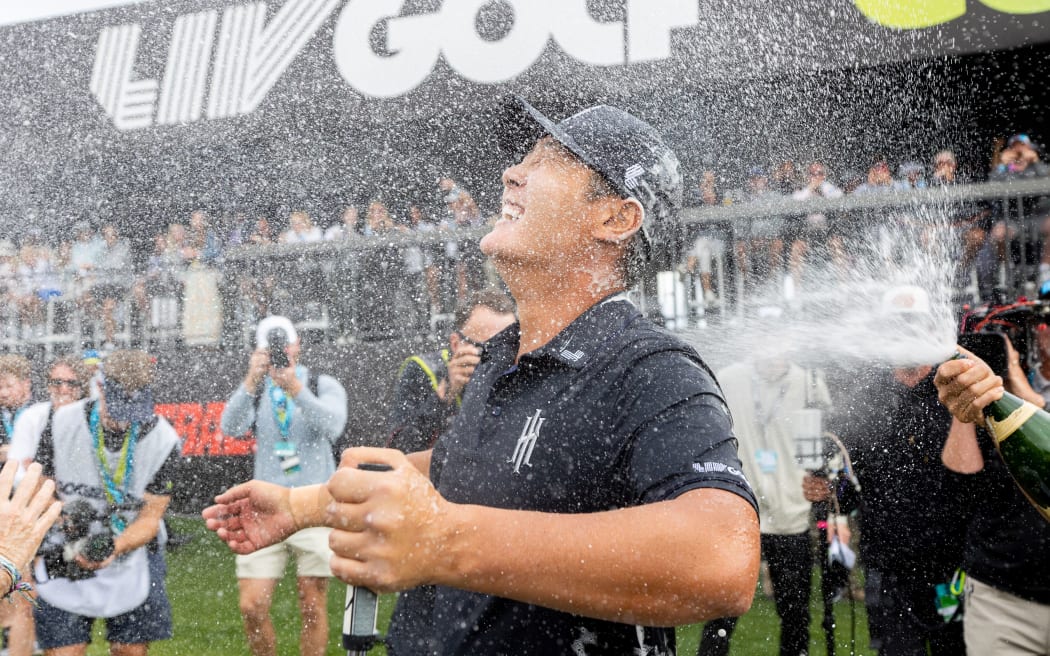Sportswashing is never far from the headlines – and it's got some sports fans questioning whether they can keep watching.

New Zealand golfer Danny Lee joined LIV Golf and it paid off, when he won the 2023 LIV Golf Tucson event Photo: photosport
Back in Ancient Greece, Alexander the Great hosted the Olympic games, not only to show off Greek sporting prowess, but as a propaganda exercise.
The event was a drawcard for dignitaries and ambassadors from across Greece, and the king was intent on promoting his might as a ruler and his own self-image as a demi-god.
Sound familiar?
"These links between sport and tourism and politics are as old as civilisation itself," says Griffith University tourism and sport researcher James Higham.
He tells that story to his students, as one of the earliest cases of sportswashing.
"These enormous global events have been harnessed, in a way, throughout history."
Today, sportswashing is synonymous with Saudi Arabia, but Higham cites famous past events as examples, such as the "Thrilla in Manila", the 1975 boxing match between Muhammad Ali and Joe Frazier for the heavyweight championship of the world.
"Why was it hosted in the Philippines? Essentially to draw attention away from the corrupt regime of Ferdinand Marcos," Higham says.
But it is the rapidly growing use of sport as a way to launder a regime's bad reputation that alarms sports journalist and former administrator Trevor McKewen.
"It's about using sport as a tool to improve a reputation that's been basically tarnished by wrongdoing. That can be an individual's wrongdoing, a group, a corporation, a government."
As an armchair spectator, he says it's stopped his enjoyment of sport; it makes him feel dirty – so much so that he is not even sure he'll be watching the US Open this weekend.
It's the first time the Saudi-backed LIV Golf rebels and PGA Tour loyalists will play together, after last week's shock announcement of a merger between the two rivals and the DP World Tour.
Some fans will be celebrating it as a showcase of the world's best players, after a year of bitter divisions and mudslinging. Not McKewen.
"I don't want to watch it from a point of anger, of willing a non-LIV golfer to win it," says the former chief executive of the Warriors NRL franchise, who has also held senior executive positions at New Zealand Rugby and Super League, and headed sport for Fairfax Media and NZME.
"I think the loyalists have been dealt a dud hand at a really bad time for international sport where you stick to your morals and you stand your ground and you end up coming out the loser.
"It's not a great message to send to a generation of sports fans."
McKewen tells The Detail sportswashing has put him off watching English football, because the two winning teams are backed by the immensely rich Saudi or Qatari interests. He wonders which of his favourite sports will be picked off next and explains why rugby can't be ruled out.
The Saudi government-backed Public Investment Fund, which has assets of more than US$600 billion, is the main driver of the regime's vision: to build sports tourism to be worth 10 percent of its GDP by 2030. Sport is now around 0.3 percent and tourism about three percent of GDP, says Higham.
"It has developed a pretty clear strategy to advance economic diversification of its oil economy and sport and tourism are seen as important strategic elements in its future economy," he says.
While it seems big money has all the power in professional sport, Higham says fans can have the last say.
"Sport-related tourism is an enormously diverse phenomenon and so too are sports fandoms," he says.
"Sports and sports teams are part of life cycles. They rise and they fall in popularity and it is really important for sports managers and team owners to be conscious of the sentiments within a body of fans because ultimately it's the fans who own the game."
Hear more about the history of sportswashing in the full podcast episode.
Check out how to listen to and follow The Detail here.
You can also stay up-to-date by liking us on Facebook or following us on Twitter.

Photo:


